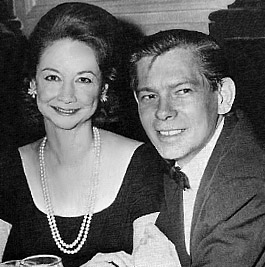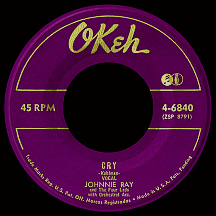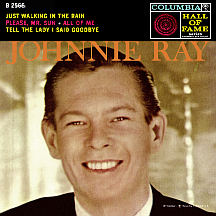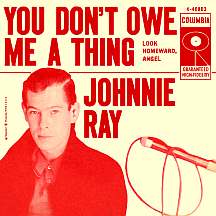JOHNNIE RAY
As soon as Johnnie Ray got going with that dramatically erratic stage presence he possessed and his overly-emotional way of delivering a song, crowds went wild...young girls especially. A quirky character but a standout performer, he was a much-needed personality among the higher-than-acceptable percentage of lackluster crooners that made up the early-'50s pop music community (sorry, Don Cornell, you were talented, man, but boring!). Life began normally enough for John Alvin Ray in the small town of Dallas, Oregon in 1927, until a head injury while horsing around with members of his Boy Scout troup left him with considerable hearing loss that got worse as time went by. His teachers, ever observant as they are often not, figured he was mentally challenged...and all the while his mind was racing as to how he might escape from what must certainly become a life trapped in dullsville. A hearing aid rescued him from near-complete deafness and by the time his teens were over, he'd headed to Hollywood to make it big as an actor.
A year later, after some untold hundreds of doors had slammed in his face, he returned home to plot his next move. Singing suited him better, but what were the odds of a hearing-impaired warbler ending up anywhere but nowhere? He hit the road and began singing in any roadside dive that would take him, and there were few at first; getting and keeping gigs in the customary caucasian nightclubs proved daunting, but he found acceptance at clubs in black neighborhoods where customers were receptive to wilder, less conventional singers...even effiminate country boys! He settled in at Morris Wasserman's Flame Show Bar in Detroit, a hotspot sometimes called "Little Las Vegas" because of its brightly-lit exterior that set the corner of John R and Canfield aglow for a block in either direction. Backed by consummate professional Maurice King, a regular at the club with his band The Wolverines and an artist for the newly-reactivated Okeh label, Johnnie let it all hang out, King immediately synced with his spasmodic vibe, and patrons responded in earnest. He was so popular that Flame Show manager Al Green paid him 350 a week...and Johnnie figured he'd hit the jackpot.
He was spotted by deejay Robin Seymour of WKMH's "Bobbin' With Robin" show, impressed that a skinny white guy could work a black crowd into such a frenzy. Next thing you know, Danny Kessler of Columbia Records' Okeh label stopped by and offered him a contract. The first single, "Whiskey and Gin," was backed by Maurice and his Wolverines and had the elements to create a sensation beyond the nightclub; a hot R&B arrangement and mildly suggestive lyrics ('...she turns out the light...there ain't a cloud in sight...she leads me to the river where the still waters flow...') were delivered in Ray's usual excitable way. The song was big in lower Michigan but somehow missed the mark in most other regions; without a visual, some were confused...was he a man or a woman? Billboard magazine described his voice as a cross between Kay Starr and jazz singer Little Jimmy Scott. Regulars at the Flame Show Bar already knew he was distinctively unique.
What Johnnie Ray really was a cross between was straight man...and gay man. Leaning towards the latter! And he got busted for it on more than one occasion, first in June '51 when he propositioned an undercover cop (he admitted his indiscretion, paid a fine, and the press fortunately didn't play it up...like, who was he, anyway?) and again in November, when Confidential magazine (the scandal rag of the time) did its first of several stories on him...the target was on his back! It was the '50s, man! Johnnie's female fans didn't care about any of this; they tore his clothes off in public on a regular basis (he took to wearing inexpensive suits, since they ended up in shreds anyway). It had happened to Sinatra earlier. It happened to Presley later. Okay, something must have set off this mania by the end of 1951 and that something was a song from the pen of a night watchman in Pittsburgh by the name of Churchill Kohlman. "Cry" was recorded that fall by Ruth Casey with the Graham Prince Ensemble for a small label named after a big car, Cadillac Records. Columbia head Mitch Miller decided it was right for Ray...along with a vocal quartet in need of a break.
The Four Lads had been with Okeh awhile, but nothing clicked until the former Toronto choirboys teamed with Oregon's "Prince of Wails." Kohlman's soft, sad little song became something far more emotional with Ray's elongated phrasing ('If your suh-weetheart sends a uh-letter...of good-byyyyyyy...') and listeners got goose-bumps...the record shot to number one and remained on top from December until early March of '52. Suddenly, thanks to a throng of adoring fans, mostly female, he was a teen idol, four years before the trend that placed male singers on a pedestal began in earnest with Elvis. It seemed everyone was listening to and talking about the "Cry" guy...Stan Freberg did his best to make Johnnie sound like an idiot with his top-selling parody "Try." "The Little White Cloud That Cried," the B side of "Cry," a similarly-conceived emotionfest composed by Ray, was a smash as well, reaching number two, just below its A side, in January. He was rerouted to the Columbia label as a result of a contract renegotiation, as were the Four Lads, and the next single, another two-sided top ten hit, impacted immediately. "Please, Mr. Sun" and "Here Am I - Broken Hearted" both contained lyrics ripe for Ray's brand of vocal theatrics. "What's the Use?" was the last with the Lads as they began building a half-decade parade of hits as nobody's second-through-fifth bananas.
An unexpected development occurred in May of '52: Johnnie walked down the aisle! Marilyn Morrison was her name and by most accounts true love was her game...though no one believes she wasn't aware of her husband's preference for the fellows. They separated several months later. Early in 1954 they were divorced. Marilyn: "I love him...but I cannot live with him." A probable attempt at making Johnnie's public image into something "respectable" had failed.
"Walkin' My Baby Back Home" had been a hit for several artists in 1931; Johnnie's single was a major hit that summer and suddenly faced competition from a version by Nat "King" Cole; both went top ten. The single became his first hit in England and one of only a few to correspond to his impressive run in America. Top U.K. sellers during the next four years included "Faith Can Move Mountains" (Cole did that one too), "Such a Night" (Ray's cover of the Clyde McPhatter and the Drifters tune topped the U.K. charts), "Hey There," "Paths of Paradise" and "Song of the Dreamer." Miller liked to put contrasting vocal duos together (Marlene Dietrich and Rosemary Clooney one of the more intriguing), so he matched "alternative lifestyle" Johnnie with Doris Day ("The World's Oldest Virgin?") for a few singles in 1952 and '53.
Back to Johnnie's personal relationships with women: his failed marriage wasn't the last! During an appearance as a "Mystery Guest" on an August 1954 episode of What's My Line?, he met panelist Dorothy Kilgallen...she was 41, he was 27. She'd made her name as a reporter who'd found renown in 1936 (at 23) by participating in a much-publicized "Race Around the World" against two newspapermen, spanning the Atlantic Ocean on the Hindenburg and crossing the Pacific on the China Clipper (Pan Am's "flying boat") over 25 days, the entire time writing columns about the experience for the New York Evening Journal that were collected in a best-selling book, Girl Around the World. Her New York-based column "The Voice of Broadway" began in 1938 and covered all manner of showbiz goings-on; she continued to dig up dirt (and occasionally covered serious news stories) after joining Arlene Francis, Bennett Cerf and host John Charles Daly on the long-running CBS-TV game show in 1950.

It seemed Dorothy and Johnnie were constant companions after connecting on What's My Line, casting suspicion on the state of her marriage and doubts as to which way Ray's urges pointed (uh...both ways, perhaps?); at any rate there was plenty of public dining, drinking, cuddling and kissing, and her "read-all-about-it" rivals kept folks up to date on every "shameful" move. Johnnie realized one youthful ambition in 1954 when he briefly dipped his toes into Hollywood's film industry with There's No Business Like Show Business, starring alongside Ethel Merman, Marilyn Monroe and Mitzi Gaynor. He sang "If You Believe," an Irving Berlin song (as was every song in the film), which turned out to be another U.K.-only hit. The slow pace of movie-making wasn't to his liking...he preferred the in-the-moment rush of performing live for audiences. Wiggling out of his film studio contract, he did take on a couple of television roles, the first in a January 1955 episode of Ronald Reagan's General Electric Theater titled Big Shot, which cast him as a singer named Johnnie (big stretch!), the second a few weeks later on Shower of Stars, where he sang one song and did little else. A frequent performer on variety shows, he often guested on the Ed Sullivan, Jackie Gleason and Perry Como series in addition to many others.
After floundering in the nether-regions of the U.S. charts for a couple of years, Ray scored another major hit with "Just Walking in the Rain," first recorded for Sun Records in 1953 by The Prisonaires, five singers incarcerated at Tennessee State Penitentiary. Johnnie wasn't familiar with the song (written by group member Johnny Bragg and another inmate, Robert Riley) when he remade it. The single peaked at number two in October (blocked from the top spot by Elvis's "Don't Be Cruel") and remained on the charts through winter '57 while enjoying a long run at number one in England. Three more substantial hits appeared in 1957; Marty Robbins' tune "You Don't Owe Me a Thing" went top ten in February and its flip, "Look Homeward, Angel" (penned by Wally Gold of vocal group The Four Esquires), made the top 40. "Yes Tonight, Josephine," a Winfield Scott-Dorothy Goodman number, was his third number one smash in Britain and final top 20 single in America.
"Build Your Love (On a Strong Foundation)" and "I'll Never Fall in Love Again" were minor hits on both sides of the Atlantic in '58 and '59 before Ray faded completely from sales surveys. He had Dorothy to console him, at least, and she sometimes mentioned him in her column despite his irrelevance to the late-'50s music scene. He left Columbia in 1960 and showed up on Archie Bleyer's Cadence label, then United Artists for a moment in '61 before Liberty Records gave him a try, pairing him with young hitmaker Timi Yuro on "I Believe." Record sales were nearly nil; a couple of other fleeting label affiliations left him without a record company in '65 and ever after. But it wasn't the end of his career by any means.
Ray's longtime companion Dorothy Kilgallen had by this time transitioned into covering more important news stories. On the morning of November 8, 1965, she was found dead in her Manhattan apartment of an apparent drug overdose. Theories immediately began circulating about a possible connection to an investigation she'd been doing on John F. Kennedy's death; it was believed she had some red-hot information on Jack Ruby, who'd murdered JFK assassin Lee Harvey Oswald, and some conspiracy theorists believe she died under mysterious circumstances. Could it have been murder? No one will ever likely know for sure. One thing is certain: a famous gay entertainer had love for one woman...and he was devastated by her death.
Live performing was Johnnie's specialty and he made the most of it for the remainder of his life. Being particularly well received overseas, he had to brush up on his "alternate" string of hit songs during U.K. tours, where some of the largest crowds turned out to see him. Johnnie Ray passed away in 1990 at age 63. He won't be forgotten; I can't see a way he ever could be, with his hard-to-ignore image, an over-the-top stage technique that commanded attention...and some really great recordings. As time passes, someone somewhere will always be curious about the famously emotional, hearing-aid-wearing sobster; you couldn't look away and you certainly couldn't not listen to him!
NOTABLE SINGLES:
- Whiskey and Gin - 1951
- Cry - 1952
by Johnnie Ray and The Four Lads / - The Little White Cloud That Cried - 1952
by Johnnie Ray and The Four Lads - Please, Mr. Sun - 1952
by Johnnie Ray with The Four Lads / - Here Am I - Broken Hearted - 1952
by Johnnie Ray with The Four Lads - What's the Use? - 1952
by Johnnie Ray with The Four Lads - Walkin' My Baby Back Home - 1952
- All of Me /
A Sinner Am I - 1952 - Love Me (Baby Can't You Love Me) /
Faith Can Move Mountains - 1952 - A Full Time Job - 1952
by Doris Day and Johnnie Ray - Somebody Stole My Gal - 1953
- Candy Lips - 1953
by Johnnie Ray and Doris Day - Such a Night - 1954
- Hernando's Hideaway /
Hey There - 1954 - If You Believe - 1955
- Paths of Paradise - 1955
- Song of the Dreamer - 1955
- Johnnie's Comin' Home - 1955
- Just Walking in the Rain - 1956
- You Don't Owe Me a Thing /
Look Homeward, Angel - 1957 - Yes Tonight, Josephine - 1957
- Build Your Love (On a Strong Foundation) - 1957
- Up Until Now - 1958
- I'll Never Fall in Love Again - 1959
- I Believe - 1961
by Timi Yuro and Johnnie Ray




